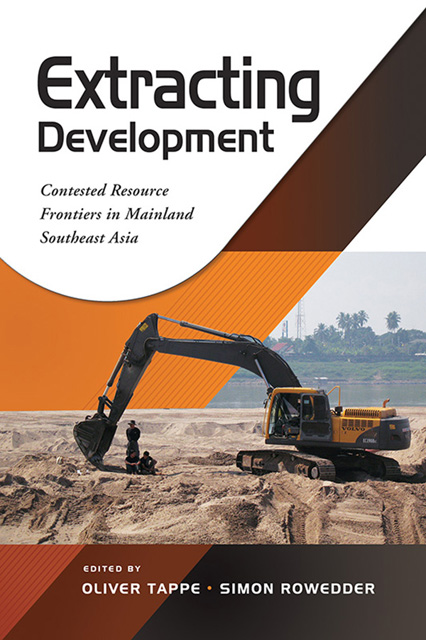Book contents
- Frontmatter
- Contents
- Acknowledgements
- The Contributors
- 1 Contested Resource Frontiers in Mainland Southeast Asia: An Introduction
- 2 Ontological Politics of the Resource Frontier: A Hydrosocial Analysis of the Mekong River in Northern Thailand
- 3 Reassembling Frontiers for Middle-Income Peasants: Rubber Expansion and Livelihood Ecosystem Transformation in a Northeast Thai Village
- 4 “Only the Best Fruits for China!”: Local Productions of a ‘Fruit Frontier’ in the Borderlands of China, Laos and Thailand
- 5 Commodity Frontiers in Motion: Tracing the Maize Boom across the Lao-Vietnamese Borderlands
- 6 New Frontier Spaces: Complex Entanglements and Power Relations (Re)shaping Land Governance in Laos
- 7 Moving Away from the Margins? How a Chinese Hydropower Project Made a Lao Community Modern and Comfortable
- 8 Frontier Capitalism in Colonial and Contemporary Laos: The Case of Tin Mining
- 9 Chinese Investments and Resource Frontiers in Cambodia: Systemic Transformation
- 10 The Open Issues: Cases between Chinese Investment Companies and Local People in Myanmar
- 11 Internationalization of RMB and Tin Ore Trade in China-Myanmar Frontier Governance: Views from Yunnan Province
- Index
3 - Reassembling Frontiers for Middle-Income Peasants: Rubber Expansion and Livelihood Ecosystem Transformation in a Northeast Thai Village
Published online by Cambridge University Press: 30 June 2023
- Frontmatter
- Contents
- Acknowledgements
- The Contributors
- 1 Contested Resource Frontiers in Mainland Southeast Asia: An Introduction
- 2 Ontological Politics of the Resource Frontier: A Hydrosocial Analysis of the Mekong River in Northern Thailand
- 3 Reassembling Frontiers for Middle-Income Peasants: Rubber Expansion and Livelihood Ecosystem Transformation in a Northeast Thai Village
- 4 “Only the Best Fruits for China!”: Local Productions of a ‘Fruit Frontier’ in the Borderlands of China, Laos and Thailand
- 5 Commodity Frontiers in Motion: Tracing the Maize Boom across the Lao-Vietnamese Borderlands
- 6 New Frontier Spaces: Complex Entanglements and Power Relations (Re)shaping Land Governance in Laos
- 7 Moving Away from the Margins? How a Chinese Hydropower Project Made a Lao Community Modern and Comfortable
- 8 Frontier Capitalism in Colonial and Contemporary Laos: The Case of Tin Mining
- 9 Chinese Investments and Resource Frontiers in Cambodia: Systemic Transformation
- 10 The Open Issues: Cases between Chinese Investment Companies and Local People in Myanmar
- 11 Internationalization of RMB and Tin Ore Trade in China-Myanmar Frontier Governance: Views from Yunnan Province
- Index
Summary
INTRODUCTION
A bus from Ubon Ratchathani city to N village, located near the Mekong River on the border between Thailand and Laos, goes through rolling hills. In the lower lands spread paddy fields, while in the higher lands bush and forests. This scenery seen from the bus window, reflecting a typical rural landscape in northeast Thailand, rapidly changed. During trips to N village in 2008 and 2010, I was astonished that many forests were replaced by rubber gardens. Several years later, I also noticed that the villagers’ lifestyle became somehow “urbanized”. Indeed, in the village, still calm and peaceful at a glance, various things were reassembled.
This chapter analyses the rapid expansion of rubber cultivation in N village, exemplifying a resource frontier. Unlike traditional understandings of frontiers as geographically peripheral places where state power and control are weak (Korf and Raeymaekers 2013), resource frontiers are venues where configurations of institutional relationships over natural resources take place, mainly due to the development of capitalism, and where existing social, cultural, political and ecological orders are reassembled into new territorial orders. Assembling or reassembling exploitation and production in resource frontiers is directed by the negotiation of multiple meanings of resources (Rasmussen and Lund 2018; Cons and Eilenberg 2019; see as well the introduction to this volume by Rowedder and Tappe). Social orders and human-nature relationships in particular locales are transformed by the development of neoliberal capitalism in relation to various actors and processes in multiple geographical scales (Barney 2009). In this chapter, I demonstrate for the case of rubber expansion in N village how resource frontier assemblages are formed that transform the people's lives and environments in Thailand's context of a contemporary rural agrarian society.
In the study site of N and neighbouring villages, community-based sustainable natural resource management had been established since the 1990s, before it turned into a frontier of rubber cultivation in the 2000s. In examining the formations of assemblages in this study site, I focus on the differences in characteristics of resource frontiers in northeast Thailand, a middle-income region, from surrounding countries. The northeast was for long the poorest region in Thailand.
- Type
- Chapter
- Information
- Extracting DevelopmentContested Resource Frontiers in Mainland Southeast Asia, pp. 49 - 78Publisher: ISEAS–Yusof Ishak InstitutePrint publication year: 2022

